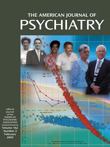To the Editor: We appreciate Dr. Gijsman’s comments regarding manic symptoms as a side effect of rapid transcranial magnetic stimulation in our study of PTSD patients. We concur with his observation that mania is not characteristic of PTSD patients; however, major depressive disorder has been estimated to be present in as many as 70% of PTSD patients as a comorbid disorder
(1). Antidepressant therapy in all depressed patients carries the risk of an iatrogenic “manic-switch,” and manic symptoms are not unexpected in rapid transcranial magnetic stimulation treatments. In fact, several cases of switching to manic symptoms induced by transcranial magnetic stimulation have previously been reported. Pascual-Leone et al.
(2) were first to study the potential lateralization of the effects of rapid transcranial magnetic stimulation on mood in normal volunteers. Application of rapid transcranial magnetic stimulation over the left prefrontal cortex induced transient feelings of sadness, whereas over the right prefrontal cortex, it induced “happiness”
(3). Garcia-Toro
(4), Dolberg et al.
(5), and Sakkas et al.
(6) have described switching to acute full-blown manic episodes during left prefrontal rapid transcranial magnetic stimulation in patients with bipolar depression. Nedjat and Folkerts
(7) reported the induction of transient hypomanic symptoms by left prefrontal rapid transcranial magnetic stimulation in three healthy volunteers. Ella et al.
(8) described two patients suffering from a treatment-resistant major depression who switched to mania after low-frequency rapid transcranial magnetic stimulation of the right dorsolateral prefrontal cortex. Because switching to mania is known to occur in affective disorder patients during antidepressant pharmacological and nonpharmacological therapies
(9) and because rapid transcranial magnetic stimulation has been shown repeatedly clinically and preclinically to have antidepressant actions
(10–
13), the authors linked these phenomena.
In our study, we reported that two patients from the active rapid transcranial magnetic stimulation treatment to the right dorsolateral prefrontal cortex (one patient from the slow-frequency and one from the high-frequency group) developed manic symptoms after the third session of rapid transcranial magnetic stimulation. We should like to make clear that in both cases the manic symptoms were in the lower range of mania or in the higher range of hypomania in terms of severity. The symptoms consisted of pressured speech, hyperactivity, flirtatiousness, overoptimistic thought, mildly increased appetite, high spirits/euphoria, jocularity, and a decreased need for sleep. Neither patient was at any time psychotic, nor was either patient at any time in a position to present any real and immediate danger to himself or herself or others.
In both cases, rapid transcranial magnetic stimulation was immediately withdrawn. Transcranial magnetic stimulation had been administered as add-on therapy, and a number of patients in the study were taking drug regimens that included selective serotonin reuptake inhibitors (SSRIs) as an integral part of their PTSD treatment schedule. This was so for one of these two patients, and the paroxetine that he had been receiving was stopped forthwith. Staff closely monitored both patients on a daily basis. The symptoms were self-limited and short-lived, lasting 2–5 days after rapid transcranial magnetic stimulation was withdrawn before abating completely.
We sought to establish whether there was some characteristic of these patients that could or should have been taken into account as a possible exclusion criterion for this therapeutic modality. None of the patients’ demographic, family historical, or clinical characteristics set these two apart from the rest of the study group. One patient had been taking an SSRI and the other had not, and both had previously suffered episodes of comorbid major depression. Moreover, each received a different regimen of rapid transcranial magnetic stimulation.
In conclusion, symptoms of mania, although uncharacteristic of PTSD, can be seen in some patients after brief exposure to rapid transcranial magnetic stimulation treatment. The symptoms here were seen to be self-limited after rapid transcranial magnetic stimulation and antidepressant medications were withdrawn. It has yet to be established whether this phenomenon is integral to transcranial magnetic stimulation as a tool, to a certain disorder, or to a certain type of patient. Further research is needed to understand the nature of this adverse effect and the possible links between the intensity (slow versus high frequency), lateralization, and location of stimulation of rapid transcranial magnetic stimulation and the illness itself and possible personality and comorbid disorders.

